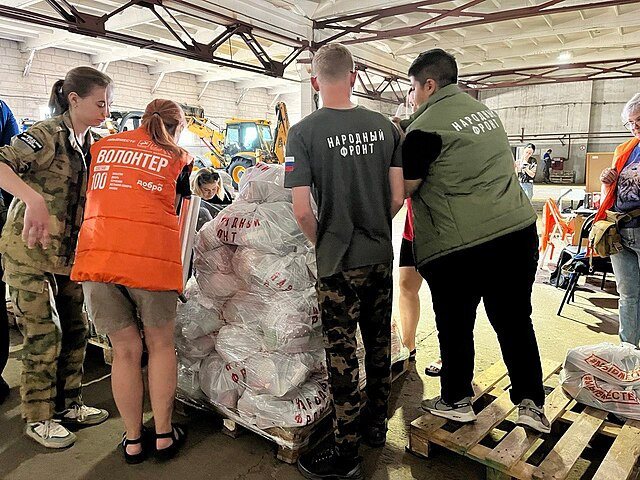Russian authorities are intensifying efforts to evacuate civilians from border regions as Ukraine's cross-border incursion into Russian territory enters its second week, signaling a significant shift in the ongoing conflict. The incursion, which began last Tuesday, has now prompted evacuations in two Russian regions-Belgorod and Kursk-highlighting the growing intensity and reach of Ukrainian military operations.
On Monday, Vyacheslav Gladkov, the governor of the Belgorod region, announced the evacuation of residents from the Krasnoyaruzhsky district due to "enemy activities" near the border. "We're having a disturbing morning - enemy activities on the border of Krasnoyaruzhsky district. I am sure that our military will do everything to cope with this threat. But to protect the life and health of our people, we are beginning to relocate people who live in the Krasnoyaruzhsky district to safer places," Gladkov stated on his official Telegram channel. According to Andrei Miskov, head of the district administration, approximately 11,000 residents have been moved to safety.
The current situation marks the most extensive Ukrainian incursion into Russian territory since the full-scale invasion began over two years ago. While Ukraine has previously targeted Russian border regions with drones and missiles, this is the first significant ground operation conducted by Ukrainian forces on Russian soil.
The scope of the Ukrainian operation remains unclear, but reports suggest that Kyiv's forces have advanced up to 30 kilometers (approximately 18 miles) into Russian territory, making it the deepest incursion since the conflict began. A video verified by CNN shows Ukrainian soldiers raising their flag in the village of Poroz, located in the Belgorod region, just a mile from the international border.
This unexpected offensive has left Russian authorities scrambling to respond. Over the weekend, thousands of residents in the neighboring Kursk region were evacuated, and the Russian government has since declared a state of emergency in the area. Belgorod's governor, Gladkov, assured residents that the military is taking all necessary measures to address the situation but also issued a missile alert, advising people to shelter in basements.
The Institute for the Study of War (ISW), a U.S.-based conflict monitoring group, suggested that the Kremlin may be downplaying the severity of the situation to avoid domestic panic and backlash. The ISW noted that Russian President Vladimir Putin has been reluctant to officially declare a state of war or initiate a general mobilization, likely to prevent further destabilization of his regime.
Ukrainian President Volodymyr Zelensky, who had remained silent about the incursion until recently, confirmed on Saturday that Ukrainian troops had crossed into Russia. In his nightly address, Zelensky stated, "Ukraine is proving that it really knows how to restore justice and guarantees exactly the kind of pressure that is needed - pressure on the aggressor." He later justified the operation as a response to the thousands of attacks launched from Russia's Kursk region into Ukraine this summer.
The strategic rationale behind Ukraine's cross-border offensive remains a topic of speculation. Some analysts believe the operation may be intended to divert Russian resources and attention from the ongoing conflict along the 600-mile frontline in eastern Ukraine. The surprise attack has undoubtedly challenged Moscow's ability to defend its borders, with reports indicating that Russia has struggled to halt the Ukrainian advance.
The incursion has also raised questions within Russia about the effectiveness of its military defenses. Pro-Russian military blogger Yuri Podolyaka described the situation as "alarming," and there is growing concern about how Ukraine was able to penetrate Russian territory so deeply. In response, Russian Foreign Ministry spokeswoman Maria Zakharova warned that a "tough response" from Russia's armed forces "will not take long."
As the conflict escalates, the evacuation of civilians continues. In Belgorod, residents were told not to panic but were instructed to evacuate immediately. Similar evacuation orders were issued in the Belovsky district of Kursk, where Governor Alexei Smirnov also issued a missile warning, advising people to take shelter in rooms without windows and with solid walls.
Meanwhile, the situation has prompted Russia's ally, Belarus, to bolster its troop presence along its border, citing concerns over Ukrainian drone incursions. The international community is watching closely as the conflict, once largely confined to Ukrainian territory, increasingly spills over into Russia, raising the stakes for both sides and complicating efforts to bring about a resolution.




